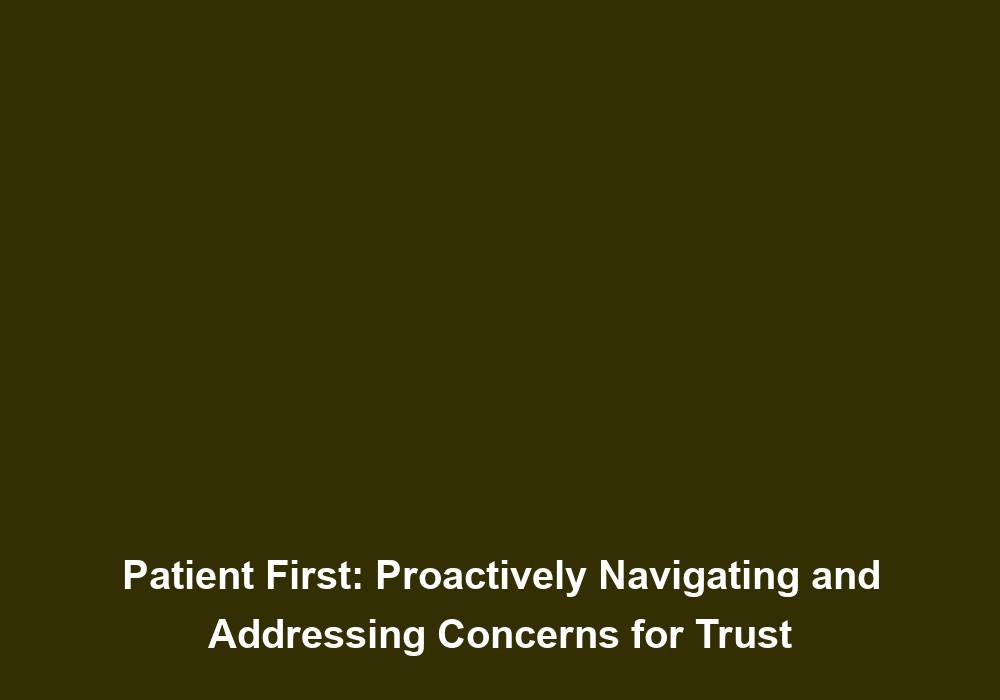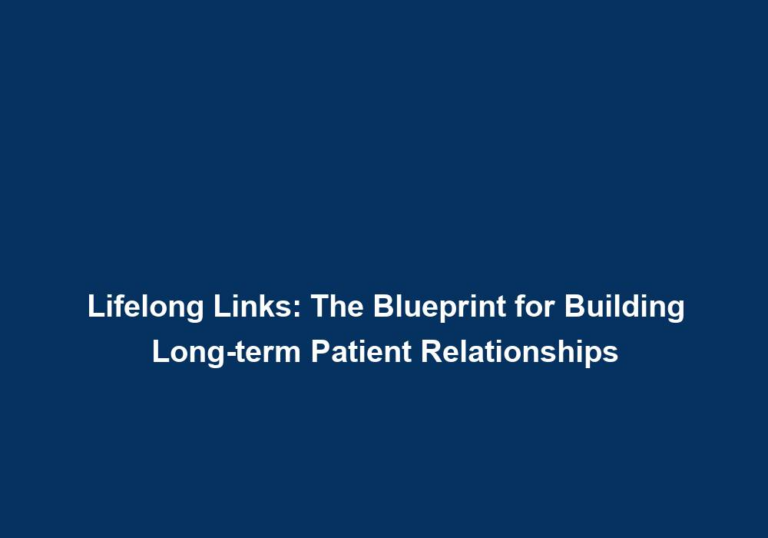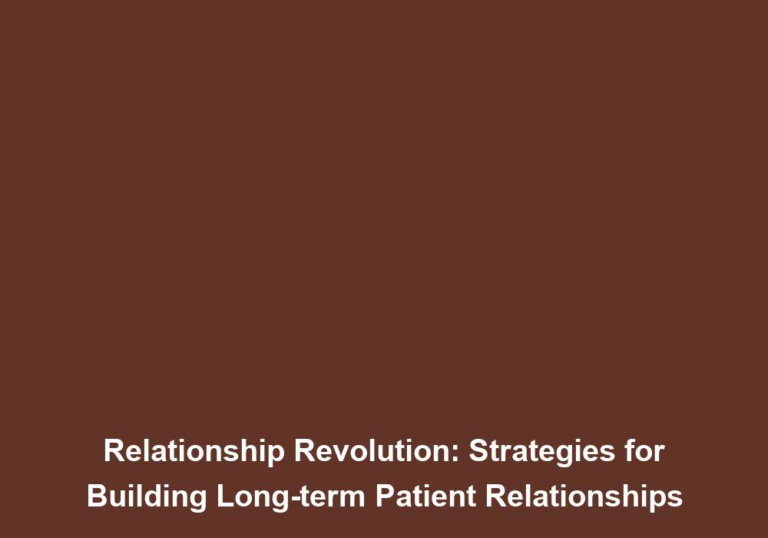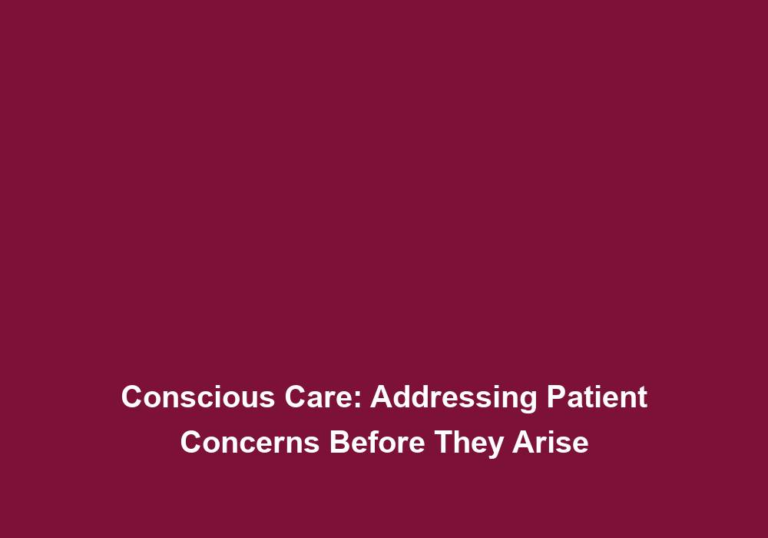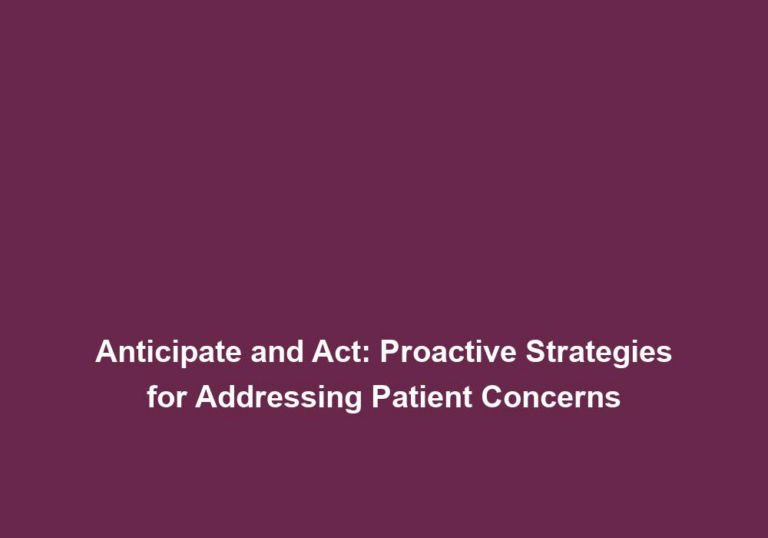Patient First: Proactively Navigating and Addressing Concerns for Trust
In today’s fast-paced and constantly evolving healthcare landscape, it is crucial for healthcare providers to prioritize patient trust and satisfaction. The success of any healthcare organization hinges on its ability to address patient concerns proactively and provide seamless experiences. By prioritizing patient-centric care and taking a proactive approach, healthcare providers can build trust and ensure patients feel valued and well taken care of. In this article, we will explore the importance of proactively navigating and addressing patient concerns and provide actionable strategies to enhance patient trust.
Understanding the Significance of Patient Trust
Patient trust is the cornerstone of any successful healthcare organization. When patients trust their healthcare providers, they are more likely to engage in open and honest communication, follow prescribed treatments, and remain loyal to the organization. Trust plays a pivotal role in patient satisfaction, loyalty, and positive health outcomes. It is vital for healthcare providers to recognize the value of patient trust and work towards building and maintaining it.
Building patient trust requires healthcare providers to consistently deliver high-quality care, demonstrate competence, and exhibit integrity in their interactions. Patients need to feel confident that their healthcare providers have their best interests at heart and are capable of providing the necessary care. By consistently meeting and exceeding patient expectations, healthcare providers can cultivate a sense of trust and foster long-term relationships.
The Need for Proactive Navigation of Patient Concerns
Proactively navigating and addressing patient concerns is a fundamental aspect of patient-centric care. By taking a proactive approach, healthcare providers can identify potential issues before they escalate, provide timely solutions, and ensure patient satisfaction. Proactive navigation can also prevent misunderstandings, minimize patient frustration, and foster a sense of trust and transparency. By actively anticipating and addressing patient concerns, healthcare providers can establish strong patient-provider relationships and achieve better overall outcomes.
To proactively navigate patient concerns, healthcare providers need to create an environment that encourages open communication and feedback. This can be achieved by implementing regular check-ins, surveys, and feedback mechanisms that allow patients to voice their concerns, provide suggestions, and share their experiences. By actively seeking out patient feedback, healthcare providers can gain valuable insights into areas that require improvement and take appropriate action.
Additionally, healthcare providers can leverage technology to track and monitor patient concerns. By implementing a digital system that captures patient feedback and complaints, healthcare providers can identify trends and patterns, allowing them to proactively address issues. This data-driven approach enables healthcare providers to allocate resources effectively, prioritize areas for improvement, and ensure that patient concerns are promptly and adequately addressed.
Strategies for Proactively Navigating and Addressing Patient Concerns
1. Effective Communication Channels
Establishing clear and accessible communication channels is crucial for proactively addressing patient concerns. Ensure that patients have multiple ways to reach out, such as phone, email, or secure messaging platforms. Implement a system that allows patients to easily schedule appointments, request prescription refills, or ask questions. Regularly monitor these channels to promptly address patient concerns and maintain open lines of communication.
In addition to traditional communication channels, healthcare providers can leverage telemedicine platforms to provide virtual consultations and follow-ups. This not only improves access to care but also allows for timely addressing of patient concerns. By embracing technology, healthcare providers can enhance the patient experience and ensure that patients can easily connect with their healthcare team whenever needed.
2. Active Listening and Empathy
When patients voice their concerns or queries, it is essential for healthcare providers to actively listen and respond with empathy. Take the time to understand their perspective, validate their concerns, and provide reassurance. Empathetic communication demonstrates that healthcare providers genuinely care and are invested in the patient’s well-being. By practicing active listening and empathy, healthcare providers can build rapport and trust with their patients.
Active listening involves giving patients undivided attention, maintaining eye contact, and displaying non-verbal cues that show interest and understanding. Healthcare providers should encourage patients to share their concerns openly and ask follow-up questions to gain a comprehensive understanding of their needs. Responding with empathy involves acknowledging and validating the patient’s emotions, expressing understanding, and offering support. By creating a safe and supportive environment, healthcare providers can foster trust and strengthen the patient-provider relationship.
3. Proactive Education and Information
Empowering patients with knowledge about their health conditions, treatment options, and preventive measures is crucial for proactive care. Provide educational materials, online resources, and personalized information to patients. Take the initiative to educate patients about potential risks, side effects, and necessary precautions. By equipping patients with the right information, healthcare providers can empower them to make informed decisions and actively participate in their own care.
In addition to providing educational materials, healthcare providers can offer personalized health coaching and counseling to address specific patient concerns. This can be done through one-on-one sessions or group workshops where patients can learn about their conditions, treatment plans, and self-management strategies. By taking a proactive approach to patient education, healthcare providers can improve patient outcomes, reduce healthcare costs, and enhance patient satisfaction.
4. Timely Appointment Management
Efficient appointment management is vital for proactive navigation of patient concerns. Minimize waiting times, ensure prompt follow-ups, and provide timely reminders for upcoming appointments. By managing appointments effectively, healthcare providers convey their commitment to patient care and respect for their time. This proactive approach minimizes patient frustration and fosters a positive patient experience.
To improve appointment management, healthcare providers can implement electronic scheduling systems that allow patients to book appointments online. This reduces the need for phone calls and streamlines the process, making it more convenient for patients. Additionally, healthcare providers can leverage automated reminder systems via text message or email to ensure patients do not miss their appointments. By optimizing appointment management, healthcare providers can enhance patient satisfaction and improve overall operational efficiency.
5. Continuous Quality Improvement
Proactively addressing patient concerns requires a commitment to continuous quality improvement. Regularly review patient feedback, identify recurring issues, and implement necessary changes. Create a culture of continuous learning and improvement within the organization. By actively addressing and resolving patient concerns, healthcare providers can enhance the overall patient experience and build a reputation for exceptional care.
In order to facilitate continuous quality improvement, healthcare providers can establish quality improvement teams or committees that are responsible for reviewing patient feedback, analyzing data, and proposing solutions. These teams can collaborate with frontline staff to identify areas for improvement and implement evidence-based practices. By prioritizing continuous quality improvement, healthcare providers can ensure that patient concerns are addressed promptly and effectively, leading to improved patient outcomes and satisfaction.
Conclusion
In conclusion, proactively navigating and addressing patient concerns is pivotal for building patient trust and ensuring patient-centric care. By establishing effective communication channels, practicing active listening and empathy, providing proactive education and information, managing appointments efficiently, and committing to continuous quality improvement, healthcare providers can enhance patient trust and satisfaction. Prioritizing patient concerns and taking a proactive approach sets the stage for a strong patient-provider relationship and leads to better health outcomes. Remember, patients are at the heart of healthcare, and by putting them first, we can create a healthcare system that truly cares and inspires trust.

